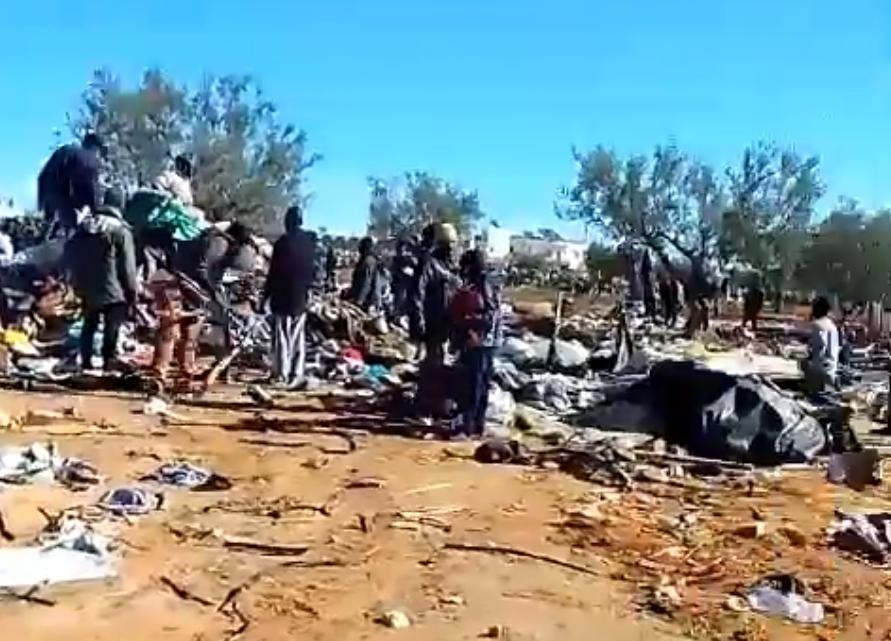Racism, Ordeal of Migrants and No End in Sight
by migration-control.info
Extreme violence and an openly racist policy against Black people have been ongoing in Tunisia for more than a year now. The already existing racism in Tunisia escalated in the beginning of 2023, catalysed by a racist and discriminatory speech against people on the move from sub-Saharan Africa, which the Tunisian President Kais Saied gave on February 21. In the days following the speech, groups of marginalised young men targeted Black people in different Tunisian cities. Black people were subjected to acts of violence, including pogroms of armed mobs. They faced several forms of institutional violence like racial profiling and arbitrary detention by security forces. Even valid residence papers did not protect Black people from violence: numerous people were arrested regardless of their residence status. Some were seriously injured, houses were set on fire and an unknown number of people disappeared. Many found themselves without shelter and food and were deprived of their right to health and transportation.
The ongoing violence culminated in illegal mass deportations to the desert areas bordering Libya and Algeria executed by Tunisian authorities. In July 2023 alone, Al Jazeera reported in a video that about 1.200 Black people were stuck at the Libyan border without food, water, and shelter. Since then, numerous deaths have been recorded and deportation to the border areas are still ongoing. Simultaneously, departures from Tunisia to Europe increased massively in summer 2023. During the four summer months alone, more than 83,000 people crossed the sea – figures that we have not seen in this region since around the mid-2010s – and besides people from Sub-Saharan countries were Tunisians themselves. In April 2023, civil search and rescue organisations and migrant solidarity networks voiced in a joint statement that Tunisia is neither a safe country of origin nor a place of safety for those rescued at sea. Violence and insecurity remain; in the following part we aim to provide an overview of the current situation.
In reaction to the increased number of crossings, border violence along the Tunisian route increased and means of control of migratory movements were reinforced. On the water, according to data from the National Guard, the number of interceptions by the Tunisian coast guard, with nearly 70,000 interceptions in the first eleven months of 2023, doubled as compared to the year before. Reports of the violent behaviour of the Tunisian coast guard – boats being pushed away and rammed, people being beaten with sticks and intimidated with gunshots, coast guard stealing engines from rubber dinghies and leaving people adrift at sea – are piling up.
What can be further observed is that the Tunisian coast guard is more actively involved in the EU-implemented “push-back by proxy regime” in the Central Mediterranean, which means that the EU is outsourcing interceptions at sea to non-European actors to reduce the number of crossings. A detailed analysis published by the CivilMRCC elaborates how four elements – strengthening the capacities of the Tunisian coastguard (equipment and training), setting up a coastal surveillance system, creating a functional MRCC, and declaring a Tunisian Search and Rescue Region – are used by the European Union and its member states to replicate in Tunisia the regime of refoulement by proxy set up in Libya just a few years earlier.
After being intercepted and brought back to land, the Central Mediterranean Analysis by the Alarm Phone, published in February 2024 states that “the deportation of people intercepted at sea by the Tunisian coastguards has become a systematic practice in recent months.” The situation for Black migrants is far from being safe on land as well. After the peak of deportations of Black migrants to the Libyan-Tunisian and Algerian-Tunisian border zones in July and September 2023, which we have also documented on migration-control.info, expulsions continue, as the Tunisian civil rights organisation FTDES reports. At the Libyan border, people are handed over by Tunisian authorities to Libyan militias, where they end up in detention centers run by armed groups. Deportations to the Algerian border zone also continue in Tunisia’s west. It is hard to assess the number of deportations, as most of the time the Tunisian authorities rob sub-Saharans, take their money, and confiscate their cell phones. Migrants therefore have little chance of providing evidence of these illegal deportations.
In addition, chain deportations from Tunisia via Algeria to Niger are documented. Algeria’s long-standing illegal practice of deporting people to Niger has been well documented by the Alarm Phone Sahara. In October 2023, the APS reported that the “practice of pushbacks continues to this day, and many of the people who found themselves stranded in Niger after being deported from Algeria report that they were already in Tunisia beforehand and had been deported from there to the Algerian border.” The activist group confirmed its observations in December, drawing on an interview with a “Guinean migrant who was initially in Tunisia, pushed back to Algeria and then pushed back to Niger.” According to an article published by the Guardian in mid-March 2024, this deportation practice has led to the separation of children from their parents by the police. “Their mums and dads go out to beg and then the police catch them and take them to Algeria,” a person is quoted in the article. In 2023, almost 1,500 unaccompanied children approached the Tunisian offices of the UNHCR to seek support.
Then there are also those who have fled their countries of origin, for whom the living conditions in Tunisia are so terrible that they would rather return than remain in Tunisia. In 2023, the International Organisation for Migration (IOM) repatriated 2,557 migrants. These “voluntary returns” are occurring in a context of violence and impossibility of earning a living, without safe alternatives of staying or moving somewhere else. In fact, the returns cannot be considered “voluntary.”
The migrants who are still waiting in Tunisia’s coastal areas for an opportunity to cross endure ongoing hardships and face police brutality. In a video posted on March 6, 2024 on X by Refugees in Tunisia, an alliance of migrants in Tunisia, one can see a person walking through olive groves, where many people waiting for a possible departure seek shelter. The video shows destroyed cabins made of plastic sheeting while a person reports that “the police came inside here today, burned our houses down, took some phones, money…They burned down all our houses. It’s not easy for us.”

Picture: https://twitter.com/RefugeesTunisia/status/1765428450695758328
Despite these documented violations of human rights, the European Union and its member states continue trying to curb the arrivals by the sea. The big promises that von der Leyen and Meloni made on their visit in Tunis in June 2023 flopped. Tunisia is still not willing to take migrants back and is not in for externalised asylum procedures. Frontex is not welcome. The EU is picking up the pieces. In a document that migration-control.info obtained, the EU admits that apart from delivery of spare parts and equipment for the coast guard, not much else has been achieved. But instead of acknowledging the freedom of movement for all, the EU continues to control migration movements and wants to finance a control center between Libya and Tunisia to limit the mobility of migrants between these countries.
While acknowledging the ongoing violence exercised by the border regime, 2023’s “little summer of migration” also shows how fragile the European closure is. People could make their way from North Africa to Europe within a very short period and the collective arrivals had the power to tear down institutions of the border regime. In September 2023 in Lampedusa, for example, the hotspot was opened due to the number of arrivals and people were transferred to the mainland quickly from where they could continue their journeys. The people affected, Tunisians, and migrants in Tunisia are constantly opposing the policies violating their human rights.
In January 2024, Al Jazeera reported on protests by families whose relatives (most of whom were reported to be from the small village of El Hancha in the Sfax Governorate) went missing when trying to leave Tunisia. The families erected roadblocks and burned tires around the village to pressure the authorities to continue their search efforts, and brought their protest to the capital to criticize the “official silence about their missing relatives.” In February, Refugees in Tunisia published a video showing a group of migrants demonstrating in Zarzis, a coastal town in Tunisia’s south, demanding rights and pressuring authorities and international organizations such as the UNCHR to provide humanitarian support and protection. Their organization and protest actions are part of years of migrant and anti-racist struggles in Tunisia and North Africa as well as in the countries of origin and European diasporas.
When the number of arrivals fell during the winter, mainly due to weather conditions, some analysts linked this to European borderwork. However, just in these days, end of March 2024, quite a few boats arrived in Lampedusa, coming from Tunisia. At the same time, there were reports on an increased number of interceptions and by-land-operations by Tunisian Coastguard and Security forces. So the race between the security forces and migrant movements has started again, in early spring 2024. Let’s support their moving and resistance, let’s continue our struggle against the violence exercised by the border regime and our struggle against the European externalisation. Freedom of Movement for all!
Further reading:
- Echoes, Issue 7, July 2023: A Critical Look at the Situation in Tunisia and the New EU-Tunisia Deal
- migration-control.info, June 2023: “This is a shame for humanity” – Update on the ongoing protest of the Refugees in Tunisia
- migration-control.info, April 2023: “If we stay here we are going to die”– Testimonies from refugees in Tunisia about their protest sit-in at the UNHCR in Tunis and its violent eviction




